Comic Strip Spread
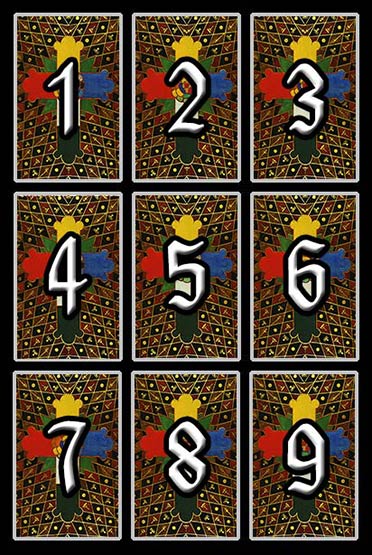
Difficulty: Easy
Note: This spread works best with decks like the Diary of a Broken Soul or Surrealist Tarot because they display scenes rather than pips and do not use reversals.
The Comic Strip Spread is a simple nine-card chronological spread that looks like a page of a comic book. This method should be used to get a glimpse of the future as it would pan out naturally. It may be insightful to use this spread in coordination with biorhythms. The spread is easy to read as a storyboard, just like a comic strip.
The main subject is apparent in the first card, while the story plays out through the following tarot cards.
It is important to pay particular attention to the cards and the relationships with their neighbours. Notice which directions the cards are facing, and how they interact.
Your Comic Strip Reading
Four of Wands (Completion)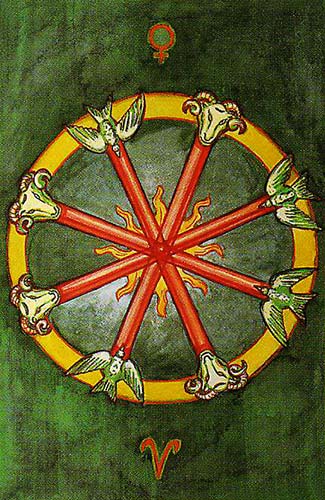 |
Three of Swords (Sorrow)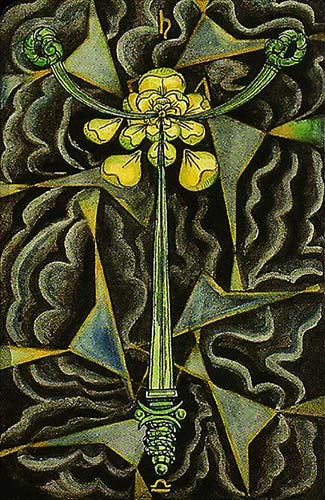 |
XII – The Hanged Man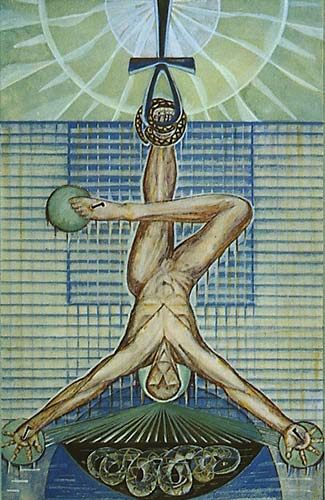 |
Five of Swords (Defeat)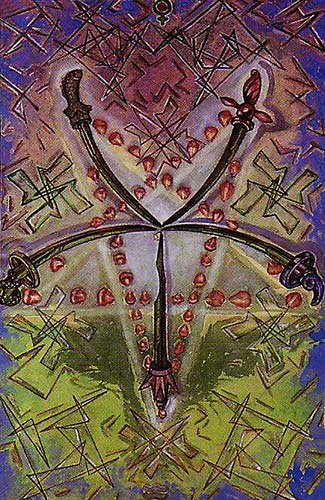 |
Six of Cups (Pleasure)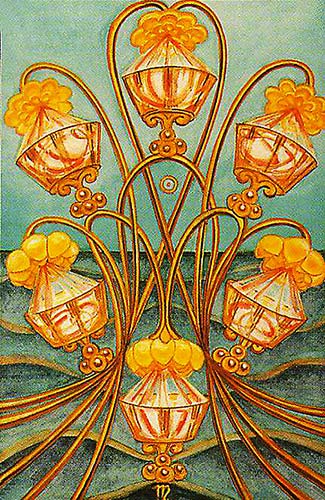 |
IX – The Hermit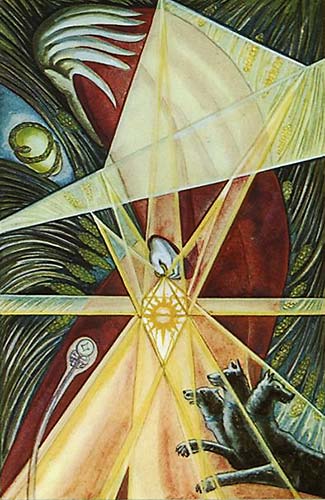 |
Three of Wands (Virtue)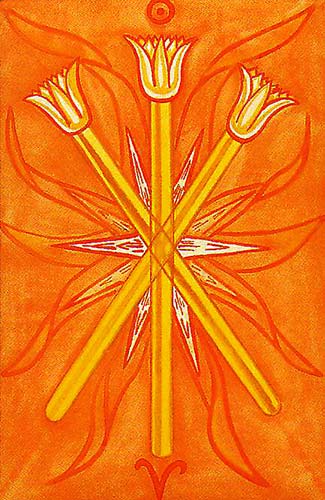 |
Prince of Swords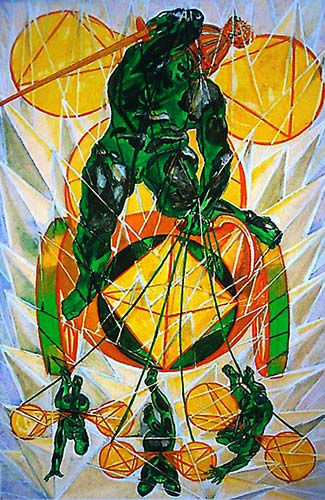 |
Four of Cups (Luxury)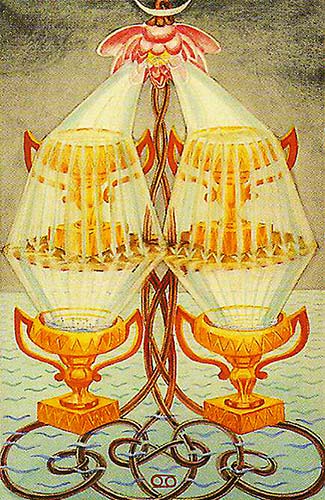 |

Card 1: Four of Wands (Completion)
Astrological Correspondence: Venus in Aries
The Four of Wands represents the harmony and stability achieved after the completion of a phase of effort or creation. It reflects the satisfaction and joy of building a firm foundation and the sense of accomplishment that follows. The card depicts four wands crossed symmetrically, forming a balanced and stable structure like a wheel. Their placement emphasises equilibrium, with the energy of Venus bringing beauty and refinement to the fiery drive of Aries.
This card is a moment to recognise the results of focused effort, where the fiery initiative of Aries is tempered by Venus' sense of harmony and aesthetics. It signifies a pause to celebrate milestones, appreciate achievements, and enjoy the peace and security of a stable structure. While it marks completion, it also carries the potential for future growth, as stability provides a springboard for new ventures. The Four of Wands reminds us to acknowledge and honour the harmony we have worked to create.
In Relationships: The Four of Wands represents harmony and stability. It suggests the foundation of the relationship has been solidified, and the time has come to celebrate the commitment and mutual understanding that exists.
In Work: This card indicates a time of achievement and recognition. You have reached a point where you can enjoy the fruits of your labour and feel confident in your progress. It's a moment of consolidation before the next phase.
Spiritually: The Four of Wands represents spiritual peace and stability. It indicates balance and alignment, where you can take time to reflect and celebrate the progress you have made on your spiritual path.
When ill-dignified: The Four of Wands may suggest an unstable or superficial foundation. You might be focused too much on external appearances or celebrations rather than addressing deeper issues. It is a warning not to take the stability for granted, as cracks may be forming beneath the surface.

Card 2: Three of Swords (Sorrow)
Astrological Correspondence: Saturn in Libra
The Three of Swords symbolises mental anguish, sorrow, and clarity from confronting painful truths. It represents the difficult, often harsh, realities of life that require one to face mental or emotional suffering head-on. The card depicts three swords touching at their points, reflecting the tension and sharpness of conflicting thoughts and emotions. This is a card of sorrow and emotional intensity, but also one that points to the healing power of facing the source of the pain.
With Saturn's influence in Libra, the Three of Swords emphasises the need for structure and discipline in dealing with mental and emotional hardship. While the card may signify heartache or betrayal, it also invites you to understand the lessons that emerge from these experiences. There is clarity in this suffering, as difficult as it may be, which leads to growth and transformation.
The Three of Swords urges you to acknowledge your sorrow, accept the lessons it brings, and move towards healing. It is a reminder that, although painful, confronting emotional distress opens the door to wisdom and resilience.
In Relationships: The Three of Swords often points to heartbreak, betrayal, or the end of a relationship. It suggests you may be facing emotional pain or a difficult separation. While painful, it can also indicate the end of confusion, as the truth gets revealed.
In Work: The Three of Swords can represent disappointment or betrayal within the workplace, perhaps a sudden failure, a broken partnership, or a loss. It signals a need to grieve and process the pain but also suggests clarity will emerge as you face the truth of the situation.
Spiritually: The Three of Swords points to the necessity of confronting inner pain or sorrow to achieve spiritual growth. This card invites you to face difficult emotions head-on and use them to develop strength and wisdom. It suggests that healing comes from acknowledging pain and moving through it with awareness.
When ill-dignified: The Three of Swords may indicate an inability to heal from old wounds, or a tendency to dwell in heartbreak without moving forward. You may be stuck in a cycle of mental suffering or unable to release old pain. It could also signify mental cruelty or the misuse of intellect in causing harm to others.

Card 3: XII – The Hanged Man
(Water, Mem)
The Hanged Man represents surrender, transformation, and the wisdom gained through self-sacrifice. Associated with Mem, the waters, this card embodies the flow of unconscious depths and the mysteries that lie beyond the material world. It is not a card of suffering but one of enlightenment through letting go.
The central figure is suspended upside-down, forming a cross with his legs, a symbol of balance and sacrifice. His arms form a triangle, evoking the union of spirit and matter. Behind him, the swirling blue-green background suggests the ocean of the subconscious. The serene expression on his face reflects the tranquillity found in surrendering to a greater truth. Around him, rays of light emanate, signifying the revelation that arises from this state of suspension.
In Relationships: The Hanged Man suggests a need for patience, selflessness, and understanding. It encourages you to see things from your partner's perspective and release control.
In Work: This card indicates a period of pause or sacrifice, where immediate goals may need to be set aside for long-term growth. You are advised to trust in the process and focus on the bigger picture.
Spiritually: The Hanged Man symbolises enlightenment achieved through surrender and the release of ego. It calls you to embrace the transformative power of stillness and contemplation.
When ill-dignified: The Hanged Man warns of stagnation, resistance to change, or clinging to outdated beliefs. You are advised to let go of what no longer serves you and embrace the wisdom of surrender.

Card 4: Five of Swords (Defeat)
Astrological Correspondence: Venus in Aquarius
The Five of Swords represents the complexities of conflict, often showing the aftermath of a battle where the victor is left with a hollow triumph. The card features five swords arranged in a dynamic, chaotic pattern, with broken blades and a sense of turbulence. This design symbolises the intellectual or mental anguish that follows a destructive confrontation.
The Venus in Aquarius influence adds a layer of detachment and the coldness of rationality, as victory here may come at the cost of relationships or the integrity of one's ideals. The imagery implies that the battle was fought without true understanding or empathy, and any success gained feels unfulfilling.
This card is a cautionary message about the nature of conflict and the price of victory. It encourages reflection on whether the victory is worth the emotional toll and whether the ego-driven approach has led to isolation. It warns of the potential for self-deception, where the illusion of winning overshadows the deeper consequences of discord. The Five of Swords highlights the danger of intellectual arrogance, encouraging a re-evaluation of motivations and the long-term effects of strife.
In Relationships: In a romantic context, the Five of Swords can indicate conflict, betrayal, or disagreements that may lead to emotional hurt. The card suggests that intellectual or verbal battles have damaged the relationship or one person has 'won' at the expense of another. It can signify a need for resolution and forgiveness, or the decision to exit a toxic situation.
In Work: The Five of Swords may represent a loss or failure because of conflict in the workplace. It could indicate a competitive atmosphere where you win but feel morally compromised or defeated, even if you technically 'won'. This card warns of the mental toll of rivalry and deceit.
Spiritually: The Five of Swords indicates inner conflict, where your mind is in turmoil. It suggests a time when your intellectual pursuits may have become disconnected from your higher purpose, and ego-driven struggles interfere with spiritual peace.
When ill-dignified: The Five of Swords represents destructive conflict, where your thoughts and actions are driven by ego, and victory is hollow or short-lived. It may suggest manipulation, deceit, or a situation where you have 'lost' even if you technically won. The mental energy is consumed in futile struggles, leaving you with no actual sense of fulfilment.

Card 5: Six of Cups (Pleasure)
Astrological Correspondence: Sun in Scorpio
The Six of Cups symbolises harmony, emotional fulfilment, and glee derived from experiences or connections. In this deck, the card features six golden cups arranged in a balanced and symmetrical pattern, overflowing with water from flowers, representing the renewal and richness of emotional energy. The imagery conveys an atmosphere of sensual satisfaction and the revitalising joy of revisiting memories or tapping into emotional resources from the past.
The Sun in Scorpio combines the warmth and illumination of the Sun with Scorpio's depth and intensity, highlighting a connection between the conscious acknowledgment of joy and the transformative power of emotional experiences. It signifies a moment of emotional harmony where the past serves as a source of strength and inspiration for the present.
The Six of Cups invites us to indulge in the pleasures of memory and connection, celebrating the richness of our emotional life. While it carries echoes of nostalgia, it is not merely a backward glance but an affirmation of the deep well of emotional abundance that fuels growth and joy. It reminds us to embrace moments of pleasure, allowing them to recharge our spirits and enrich our present.
In Relationships: The Six of Cups can suggest a reunion with a past lover or rekindling of childhood affection or relationships that hold emotional nostalgia. It may also indicate a period of emotional healing, where you can find solace in the purity of love once experienced or remembered.
In Work: The Six of Cups might represent revisiting passions, returning to work or environments where you once found emotional fulfilment. This card suggests drawing on experiences or revisiting a childhood dream or ambition could help bring growth and emotional satisfaction in your career.
Spiritually: The Six of Cups speaks to a desire for a return to spiritual innocence and simplicity. It can be a reminder to embrace the spiritual joy and wonder of childhood or early spiritual experiences. It may also indicate a time to reconnect with old spiritual practices that once felt powerful, or to seek comfort in sacred places or rituals.
When ill-dignified: The Six of Cups may point to excessive attachment to the past, nostalgia for things that no longer serve you. There may be a reluctance to move forward, clinging to former relationships or times with an unrealistic expectation. You may feel stuck, as if you are living in the past and unable to embrace the present or future.

Card 6: IX – The Hermit
(Virgo, Yod)
The Hermit represents the seeker of inner truth and the wisdom gained through solitude and introspection. Associated with Yod, the hand, this card embodies the divine spark of creation and the active quest for enlightenment. Virgo, the zodiac of analysis and service, lends the Hermit its meticulous and introspective energy.
The Hermit is a lone figure cloaked in red, symbolising both the concealment and revelation of profound mysteries. He holds a glowing lantern containing a star, representing the union of opposites and the illumination of divine wisdom. A serpent coils around the cosmic egg, an emblem of transformation and esoteric knowledge. In the foreground, a radiant yellow glow symbolises enlightenment, while the crop around him suggests the fertile soil of the unconscious mind.
In Relationships: The Hermit suggests introspection or solitude. It encourages you to seek clarity and the understanding of your own needs before reengaging with others.
In Work: This card indicates the value of independent effort and the importance of inner guidance. You are encouraged to trust your own wisdom and focus on long-term goals rather than immediate results.
Spiritually: The Hermit represents the solitary journey of self-discovery and pursuit of higher knowledge. It calls you to turn inward and seek truth through meditation and reflection.
When ill-dignified: The Hermit warns of isolation, excessive withdrawal, or a reluctance to share one's insights. You are advised to balance your introspection with meaningful connection and ensure you are not avoiding life's responsibilities.

Card 7: Three of Wands (Virtue)
Astrological Correspondence: Sun in Aries
The Three of Wands represents the harmonious alignment of will, action, and purpose. It symbolises confidence, leadership, and the strength to act with integrity. The card depicts three wands crossed in balance, radiating stability and mutual support. Flames emanate from the centre, representing the creative and dynamic energy of fire that has been focused and directed constructively.
This card is about the manifestation of one's will through effort and coordination. It marks the point where initial efforts have taken root and a solid foundation has been established, allowing for continued growth and success. Unlike the chaos of unbridled ambition, the Three of Wands reflects a disciplined and virtuous use of power, ensuring that actions align with one's higher principles. It is a card of optimism, self-assurance, and the momentum to build upon early achievements.
In Relationships: The Three of Wands indicates growth and development. The connection has reached a point where both parties can begin to see the potential for a shared future and greater commitment.
In Work: This card suggests you are beginning to see the first signs of success from previous efforts. It encourages you to continue building on their foundations and look forward to even greater accomplishments.
Spiritually: The Three of Wands represents the expansion of spiritual knowledge and understanding. It signifies progress and the beginning of a deeper connection with the divine.
When ill-dignified: The Three of Wands may suggest overconfidence, impatience, or a lack of focus. You could be spreading yourself too thin or expecting results too quickly. It advises careful planning and the need to be patient as the process unfolds.

Card 8: Prince of Swords
Element: Air of Air
Astrological Correspondence: Aquarius
The Prince of Swords represents a dynamic, often turbulent intellectual force. He is depicted riding a chariot-like structure, pulled by three Lilliputian figures, each struggling in a different direction, symbolising the internal conflict and disunity that comes with intense mental activity. This chaotic pull in multiple directions reflects the Prince's struggle to channel his intellectual energy.
The Prince of Swords embodies Air applied to Air, showing the intellectually driven nature of his pursuit of truth and knowledge. However, this energy can be scattered or unstable, as represented by the Lilliputians' differing pulls. He is an embodiment of restless, high-speed thought, capable of sharp analysis and quick action but also prone to inconsistency or confusion when trying to bring his varied ideas together.
This card indicates you may experience a time of mental restlessness or confusion, with a desire to move forward but finding it difficult to unify or direct your intellectual energy. The Prince of Swords urges attention to the need for mental clarity and unity in action. He advises against impulsivity and instead promotes focused, determined efforts to overcome obstacles and align thoughts.
In Relationships: The Prince of Swords represents an intellectual or communicative partner who approaches relationships with sharp analysis and a desire for mental stimulation. This card can indicate a relationship characterised by debate, challenge, or an intense exchange of ideas. It may also suggest that you are approaching love with intellectual detachment or overly logical thinking.
In Work: The Prince of Swords indicates quick, decisive action, often focusing on intellectual pursuits. You may be engaged in a fast-paced work environment, making quick decisions and moving forward with mental clarity and vigour. However, this card warns against hasty action that could overlook details or neglect the emotional aspects of a situation.
Spiritually: The Prince of Swords suggests active mental exploration and intellectual pursuit of higher truth. This card indicates a time of intense study, research, or the application of intellectual rigour to spiritual matters. You may be seeking enlightenment through clear thought and analysis.
When ill-dignified: The Prince of Swords can represent a rash, impulsive, or reckless approach to problems. You may be acting without considering the consequences, leading to unnecessary conflict or mental burnout. This card warns against being intellectual at the expense of emotional or spiritual sensitivity.

Card 9: Four of Cups (Luxury)
Astrological Correspondence: Moon in Cancer
The Four of Cups, or Luxury, represents the fulfilment and abundance that comes with emotional satisfaction and the enjoyment of what is already in one's life. It symbolises emotional contentment, where you can reflect on what has been achieved and the blessings already received.
The card features four cups arranged in a square formation, with light flowing from the top two cups down into the bottom two. This light represents the emotional flow of abundance and fulfilment, symbolising the harmonious exchange of emotions. The imagery conveys a moment of emotional reflection, where you recognise the blessings in your life and enjoy a sense of gratitude and stability. The Four of Cups invites you to acknowledge the wealth of emotional experiences and satisfaction you have gained, encouraging you to savour and appreciate the emotional contentment you have achieved.
In Relationships: The Four of Cups may indicate emotional dissatisfaction, disillusionment, or boredom in the relationship. You may be so focused on disappointments or unfulfilled desires that you do not recognise new possibilities or opportunities for emotional connection.
In Work: Professionally, this card suggests a feeling of emotional or creative stagnation. You may feel unfulfilled by your work or uninspired by your current role. There may be dissatisfaction, and you may need to seek new challenges or engage in deeper introspection to reconnect with your passion and purpose.
Spiritually: The Four of Cups suggests emotional withdrawal or spiritual apathy. You may be disconnected from your spiritual path, lost in self-doubt, or focused on past disappointments. The card invites you to open your heart to new possibilities and reconsider what might be missing in your spiritual practice.
When ill-dignified: The Four of Cups may point to a state of emotional block or closed-off behaviour. You may be emotionally repressed, unwilling to confront or process your feelings. There may be a tendency to dwell in negativity or missed opportunities, leading to a cycle of dissatisfaction that is hard to break.